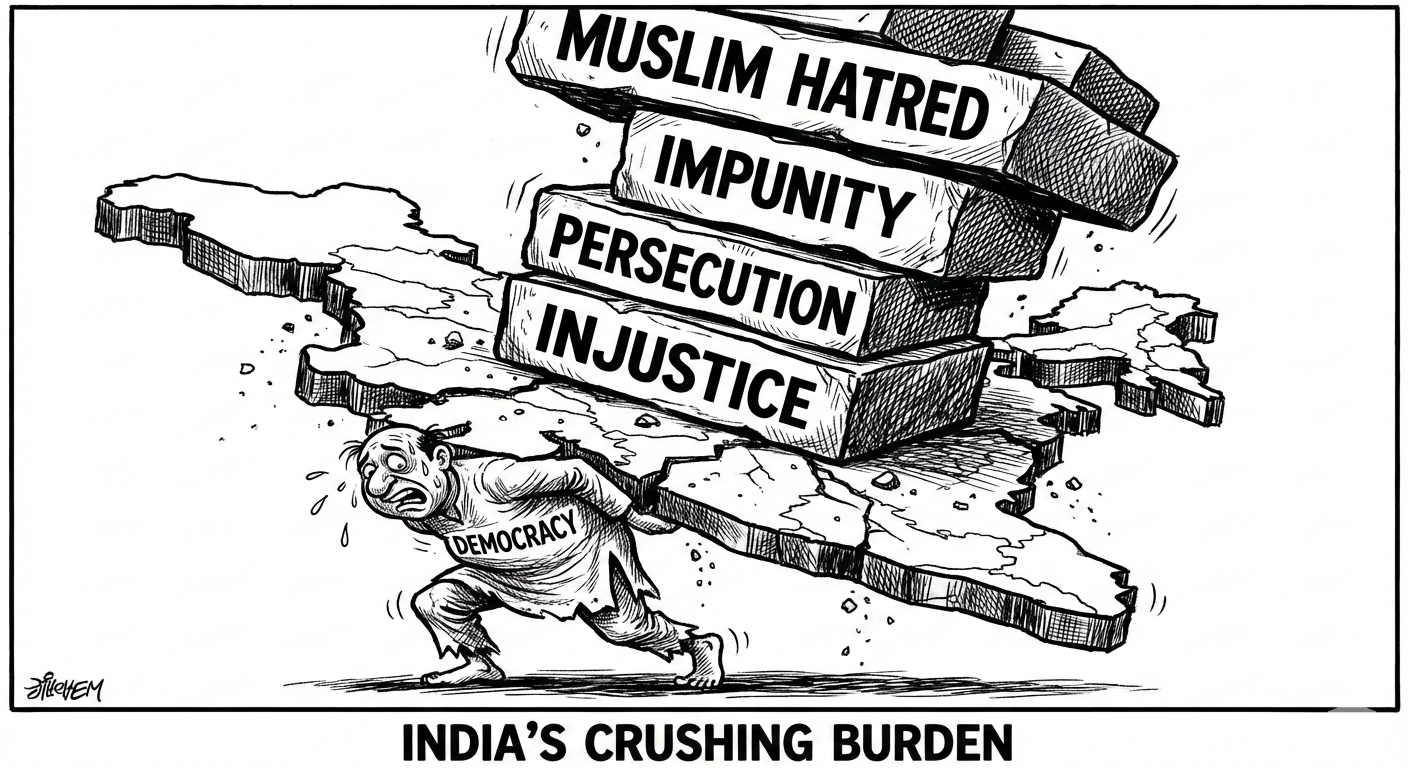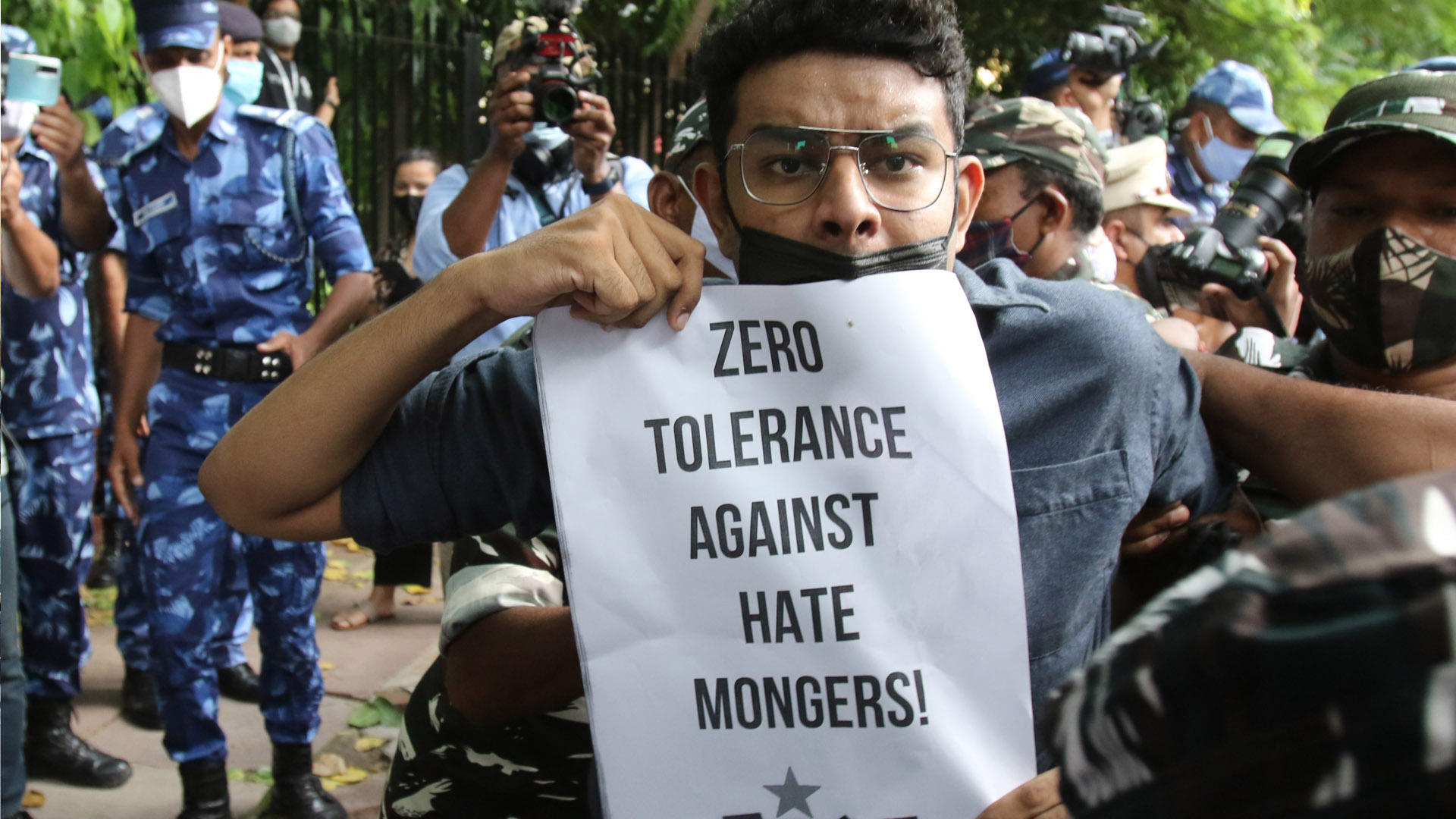
The three stories from India in this issue of The Muslim News, each chilling on its own, together reveal a nation drifting toward the everyday acceptance of anti-Muslim hatred since Narendra Modi took office in 2014. These are not random tragedies; they are warning flares from a society where hate speech has become routine, mob violence expected, and accountability a vanishing act.
A young Muslim man beaten to death on Diwali night in Delhi; a child forced to apologise after a mob storms her home over a remark about food; a former ruling-party lawmaker openly promising government jobs to Hindu men who “bring Muslim girls.”
These incidents occur across different states, involve a variety of actors, and arise from varied sparks. Yet one undeniable thread binds them: Muslims are targeted simply for being Muslim, while those who stoke or commit these abuses often feel shielded by political cover, police apathy, or a public discourse steeped in relentless dehumanisation.
Salman Mushtaq’s killing in Delhi began with what should have been a minor dispute over filming videos, yet it spiralled into brutal, lethal violence aimed squarely at the Muslim men involved. Neighbours speak of a pervasive “climate of fear,” and they are not exaggerating. Across India, minor provocations have repeatedly turned deadly when Muslims are involved, transforming everyday life into a minefield of suspicion and peril. Mobs grow emboldened when hatred is rewarded with silence, and when those entrusted with justice look the other way, terror becomes routine and fear a constant companion.
In Ghaziabad, a child’s offhand comment about beef, a food taboo for many Hindus, was seized as a pretext for a mob to storm a Muslim family’s home. Men hurled slurs, beat the girl, and forced her into a bruised, coerced apology, which they filmed and circulated online like a trophy of humiliation. Even more shocking, the police filed a case against the child herself, a cruel inversion of justice. This harrowing episode reflects a wider, well-documented pattern: Muslim victims are routinely treated as offenders, while perpetrators, often connected to extremist groups—face little or no accountability.

Delhi police detain activists and students’ unions during a protest against recent incidents of anti-Muslim violence in India’s north-eastern state of Tripura in New Delhi, October, 29, 2021. (Credit: Imtiyaz Khan/Anadolu Agency)
In Uttar Pradesh, a former BJP legislator brazenly offered government jobs in return for “bringing Muslim girls”, an unmistakable invitation to harassment, abduction, and communal exploitation. The crowd’s frenzied cheers underscore how disturbingly normalised such vile rhetoric has become. This is not the fringe; this is an elected official wielding public authority, speaking the language of hate that countless others now echo with impunity.
India’s constitutional values promise equal protection for all citizens. Article 14 guarantees equality before the law and equal protection under it; Article 15 prohibits discrimination on grounds of religion, race, caste, sex, or place of birth; Article 21 protects the right to life and personal liberty; and Article 25 ensures freedom of conscience and religion. Yet the reality is increasingly at odds with these pledges. Hindu nationalist rhetoric, once confined to the margins, has seeped into mainstream politics, amplified by social media networks, and echoed loudly at rallies and street corners.
Islamophobic attacks on Muslims now follow a grimly predictable pattern. A minor dispute or innocuous social media post can ignite a confrontation, quickly escalating as mobs—often linked to organised extremist groups—mobilise with alarming speed.
These assaults are filmed and shared online, turning violence into a spectacle meant to intimidate entire communities. Meanwhile, police responses are sluggish, ambiguous, or openly biased, and the broader political climate often rewards, excuses, or ignores the perpetrators. This is not random chaos; it is a carefully nurtured cycle, sustained through silence at the top, complicity in the middle, and active participation at the grassroots.
India is not lacking laws against hate speech, assault, abduction, or incitement to violence. What it lacks is the political will to enforce them equally. The selective use of the state apparatus, charging a bruised Muslim child while extremists livestream their threats, undermines not only minority rights but the very legitimacy of the justice system.
Rights groups have repeatedly warned that the country is entering a perilous phase of impunity. The demolition of Muslim homes without due process, vigilante “cow-protection” killings, harassment of interfaith couples, and the weaponisation of social media outrage all reflect a systematic erosion of constitutional safeguards. When hate is rewarded and dissent punished, violence is not an accident, it is an outcome.

Archive photo: Indian security personnel detain student activists during a New Delhi protest condemning anti-Muslim slogans shouted at a Jantar Mantar rally, August 10, 2021.(Credit: Pankaj Nangia/AA)
Human Rights Watch has uncovered another alarming dimension of persecution: since May 2025, authorities in India have unlawfully expelled hundreds of Bengali-speaking Muslims to Bangladesh without due process. Many of those expelled are long-time residents of India—some even Indian citizens—yet were forcibly rounded up, taken to the border, and pushed into Bangladesh, often under threats or physical coercion by state officials. These expulsions, concentrated in BJP-governed states, violate international human rights law and further illustrate how state machinery is being deployed to target Muslim communities. The demolition of homes, vigilante violence, harassment, and arbitrary expulsions all represent a systematic dismantling of constitutional safeguards. When hate is rewarded and dissent punished, violence is not accidental—it is deliberate.

India is home to the world’s second-largest Muslim population. When fear stalks the streets and communities are hounded simply for their faith, the very soul of Indian democracy falters. These stories expose more than the vulnerability of a single community, they lay bare the rot spreading through India’s social fabric. They depict a society where mobs mete out punishment without law, where political leaders toy with rhetoric verging on incitement to genocide for applause, and where the state turns a blind eye, or worse, actively abandons, its solemn duty to protect. In such a climate, the promise of justice becomes hollow, and the foundations of coexistence tremble under the weight of sanctioned hatred.
A memory of freedom (pre-2014): Before the current trajectory took hold, India was celebrated as a beacon of democracy. In 2013, just before the Modi government’s first term, Freedom House classified the country as “Free,” awarding it a robust score of 77/100 with high marks for civil liberties. India ranked 27th on the EIU Democracy Index (score 7.92) and held a solid 0.567 on the V-Dem Liberal Democracy Index.
The unsettling reality (post-2014): Since 2014, India’s democratic indicators have plunged sharply, revealing a stark erosion of political freedoms and civil liberties. Freedom House now classifies India as “Partly Free,” with an online freedom score of just 51/100. Globally, the Human Freedom Index ranks India 110th, and the World Press Freedom Index places it at a shocking 151st out of 180 countries. These figures are more than statistics—they are the quantifiable symptoms of a deeper moral collapse. This trajectory threatens not only the safety of Muslims but the pluralistic identity of India itself. A functioning, honourable democracy cannot endure when any major community is systematically treated as prey.
The moment for action is urgent. Those who commit or incite these attacks—including politically connected figures—must face swift and uncompromising prosecution. Silence from senior political leaders is complicity; they must denounce hate speech publicly and unequivocally. Police forces cannot remain passive—reform and accountability are essential to guarantee equal protection for all communities. Hate-crime monitoring must be strengthened, with independent oversight to ensure the law is enforced, not ignored. Civic society and the media must challenge misinformation, dismantle conspiracy theories, and confront propaganda that fuels division and terror. The safety, dignity, and very future of millions hang in the balance, and delay is a luxury India cannot afford.
It risks normalising violence against its largest minority, letting fear, hatred, and impunity harden into lawless custom. Or it can reclaim the constitutional promise of equality and coexistence, defending the rights, safety, and dignity of millions before the damage becomes irreversible. The nation’s moral and democratic future hangs in the balance, and its next choice will echo for generations. This decision will determine not only the safety of millions of Muslims but the very soul of Indian democracy.
Feature cartoon: (Credit: Gemini generated AI/The Mulsim News)